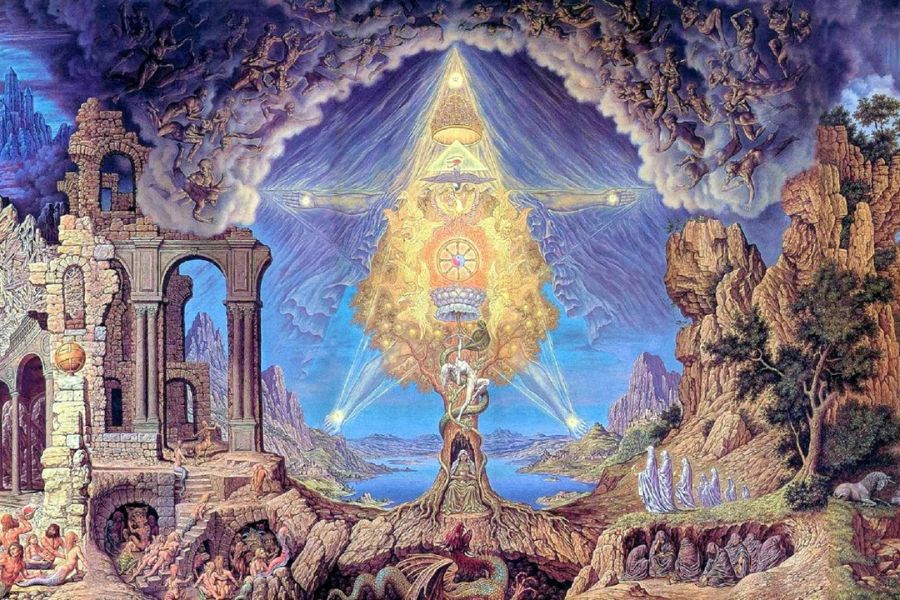The quest for the true meaning of life, the Eternal, or even understanding what we call "God," has been a constant in the human journey.
Over the centuries, countless philosophies, religions, and belief systems have emerged as ways to guide the human mind to this transcendental truth. However, as Jiddu Krishnamurti teaches us, the true discovery of what is real and meaningful requires something much deeper than accumulating knowledge or following dogmas: it demands a total liberation from conditioning.
Krishnamurti challenges us to question the very act of studying philosophy, reading the teachings of great spiritual masters, and absorbing the knowledge contained in sacred texts. He asks, "Do you think that the knowledge you’ve acquired from instructors and books will lead you to what is true?" This provocation leads us to reflect on the role knowledge plays in our search for truth. Knowledge, while important in many areas of life, can be an obstacle on the spiritual path. According to Krishnamurti, it only feeds the mind with superficial information, preventing us from accessing the profound understanding of who we truly are and what exists beyond our everyday experience.
He observes that, in the context of religions and philosophies, accumulated knowledge often serves as a means to display erudition or sharpness in conversation. However, this erudition has limited value. The true purpose of knowledge is not to showcase wisdom or compete with others, but to discover the essence of our existence and the universe. "Without the discovery of what is real, what is true, our lives become of little significance," Krishnamurti reminds us. To find the Eternal, we must abandon what we know, question the beliefs and traditions that were taught to us, and arrive at an understanding without the mediation of preconceived concepts.
This perspective leads us to Krishnamurti's central concept of religious freedom. True freedom is not merely a liberation from external structures, but an inner emancipation, a freedom from the mental conditioning and beliefs imposed upon us. For him, "if we simply say that something exists beyond, accept it, and expect to achieve it, we show ourselves to be very superficial." The path to true freedom requires a mind stripped of prejudices, labels, and identities—a mind that can observe what is before it without the lens of conditioning.
Krishnamurti invites us to abandon all identification with religious doctrines, such as Christianity, Hinduism, or Buddhism. "Now, you must cease to be Christians, Hindus, Buddhists, or yoga practitioners; you must leave all that behind completely so that 'what is beyond' can manifest." This does not mean a call for negation, but for total liberation from what has already been learned, so that the mind can be open and receptive to the new, to the unknown. In this context, the true seeker is not a Christian, Hindu, or Buddhist, but a human being in search of the truth that lies beyond all ideologies.
Krishnamurti emphasizes that the mind must be able to observe its own conditioning. "Can the mind become aware of its own conditioning?" He challenges us not only to observe the superficial conditioning but also the images, ideologies, symbols, and philosophies that run deep within the mind, shaping our worldview. This awareness is essential for true religious freedom, which, according to him, is the only force capable of generating a revolution that can transform the world.
This revolution is not external; it is not political or social, but an inner revolution—a radical transformation of the human mind, which can only occur when we are able to see, clearly and without distortion, the reality of what we are and what surrounds us. When the mind is freed from conditioning, it becomes pure and new, capable of experiencing the truth directly, without the interference of accumulated concepts or practices.
In essence, Krishnamurti proposes a new kind of journey: one without guarantees, without external support, without knowledge, where the mind places itself in a state of total receptivity and openness. This is true religious freedom—the freedom to be, without the shackles of culture, tradition, or ego. Only when the mind is free of all conditioning can it make the radical discovery of truth, of reality, of what is eternal.
Therefore, Krishnamurti's lesson challenges us to look within, to deeply question our own minds, and perhaps even to abandon the relentless search for external answers. Truth is not found in books, nor in the teachings of masters, but in the ability to observe life without the filters of accumulated knowledge and mental conditioning. And thus, the journey to freedom and the discovery of the real begins—not with the accumulation of knowledge, but with the purity of a mind free from labels, ideologies, and beliefs.




















